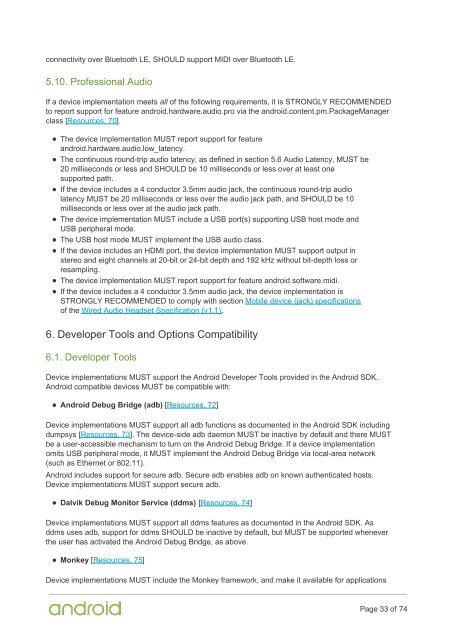Compatibility Definition
2f44OdUf0
2f44OdUf0
You also want an ePaper? Increase the reach of your titles
YUMPU automatically turns print PDFs into web optimized ePapers that Google loves.
connectivity over Bluetooth LE, SHOULD support MIDI over Bluetooth LE.<br />
5.10. Professional Audio<br />
If a device implementation meets all of the following requirements, it is STRONGLY RECOMMENDED<br />
to report support for feature android.hardware.audio.pro via the android.content.pm.PackageManager<br />
class [Resources, 70].<br />
The device implementation MUST report support for feature<br />
android.hardware.audio.low_latency.<br />
The continuous round-trip audio latency, as defined in section 5.6 Audio Latency, MUST be<br />
20 milliseconds or less and SHOULD be 10 milliseconds or less over at least one<br />
supported path.<br />
If the device includes a 4 conductor 3.5mm audio jack, the continuous round-trip audio<br />
latency MUST be 20 milliseconds or less over the audio jack path, and SHOULD be 10<br />
milliseconds or less over at the audio jack path.<br />
The device implementation MUST include a USB port(s) supporting USB host mode and<br />
USB peripheral mode.<br />
The USB host mode MUST implement the USB audio class.<br />
If the device includes an HDMI port, the device implementation MUST support output in<br />
stereo and eight channels at 20-bit or 24-bit depth and 192 kHz without bit-depth loss or<br />
resampling.<br />
The device implementation MUST report support for feature android.software.midi.<br />
If the device includes a 4 conductor 3.5mm audio jack, the device implementation is<br />
STRONGLY RECOMMENDED to comply with section Mobile device (jack) specifications<br />
of the Wired Audio Headset Specification (v1.1).<br />
6. Developer Tools and Options <strong>Compatibility</strong><br />
6.1. Developer Tools<br />
Device implementations MUST support the Android Developer Tools provided in the Android SDK.<br />
Android compatible devices MUST be compatible with:<br />
Android Debug Bridge (adb) [Resources, 72]<br />
Device implementations MUST support all adb functions as documented in the Android SDK including<br />
dumpsys [Resources, 73]. The device-side adb daemon MUST be inactive by default and there MUST<br />
be a user-accessible mechanism to turn on the Android Debug Bridge. If a device implementation<br />
omits USB peripheral mode, it MUST implement the Android Debug Bridge via local-area network<br />
(such as Ethernet or 802.11).<br />
Android includes support for secure adb. Secure adb enables adb on known authenticated hosts.<br />
Device implementations MUST support secure adb.<br />
Dalvik Debug Monitor Service (ddms) [Resources, 74]<br />
Device implementations MUST support all ddms features as documented in the Android SDK. As<br />
ddms uses adb, support for ddms SHOULD be inactive by default, but MUST be supported whenever<br />
the user has activated the Android Debug Bridge, as above.<br />
Monkey [Resources, 75]<br />
Device implementations MUST include the Monkey framework, and make it available for applications<br />
Page 33 of 74


